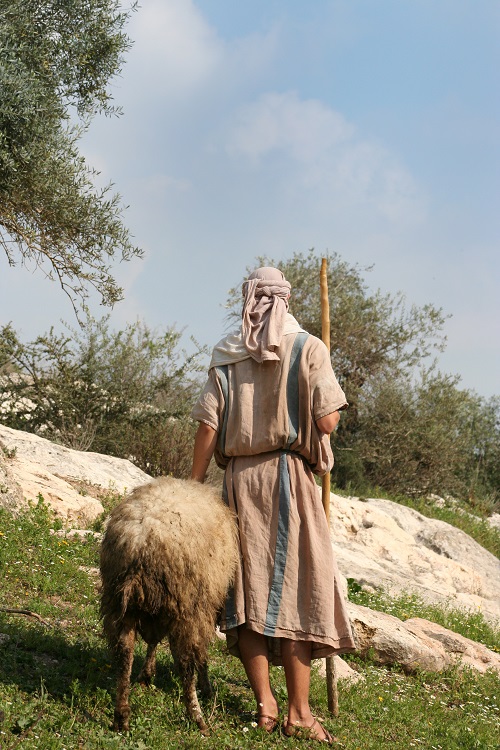

by Mark Mayberry
Synopsis: As shepherds watch over the flock—feeding, tending, protecting, elders perform the same function in local congregations. Moreover, parents share similar responsibilities toward their children.
On the night of His betrayal, Jesus warned the disciples that they faced an imminent spiritual crisis, saying, "You will all fall away because of Me this night, for it is written, 'I will strike down the shepherd, and the sheep of the flock shall be scattered.'" Peter affirmed, "Even though all may fall away because of You, I will never fall away" (Matt. 26:30-35). Yet, before the evening was over, Simon Peter, having denied the Lord three times, went out and wept bitterly (Luke 22:54-62).
On the morning of the resurrection, when the women reported their encounter with the angels, Peter got up and ran to Jesus' tomb. "Stooping and looking in, he saw the linen wrappings only; and he went away to his home, marveling at what had happened" (Luke 24:12; cf. John 20:3-10).
Afterwards, Jesus presented Himself alive by many convincing proofs (Acts 1:3), appearing to Simon and the other disciples (Luke 24:33-34; cf. 1 Cor. 15:3-8). Yet, Peter remained in a despondent state. Calling several of the disciples together, he said, "I am going fishing" (John 21:1-3). Peter and company (several of whom were former fishing partners) journeyed northward to the Sea of Tiberias. Getting into a boat, they spent a night in fruitless effort—catching nothing.
In the morning, Jesus again manifested Himself to the disciples. He spoke with them, performed a notable miracle, and then served them breakfast (John 21:4-14). Afterwards, Jesus restored Peter to his apostleship (John 21:15-17). From time to time, we face a similar need. Have you ever failed yourself and disappointed others? Of course. All of us have. The counsel that Jesus offered Peter gave him renewed purpose. Applying these concepts to our own lives helps restore our motivation and focus.
So when they had finished breakfast, Jesus said to Peter, "Simon, son of John, do you love (agapaō) Me more than these?" He said to Him, "Yes, Lord; You know that I love (phileō) You" (v. 15). He said to him again a second time, "Simon, son of John, do you love (agapaō) Me?" He said to Him, "Yes, Lord; You know that I love (phileō) You" (v. 16). He said to him the third time, "Simon, son of John, do you love (phileō) Me?" Peter was grieved because He said to him the third time, "Do you love (phileō) Me?" And he said to Him, "Lord, You know all things; You know that I love (phileō) You" (v. 17).
Reflecting upon the subtle distinction between agapaō and phileō, the former signifies seeking the highest good of another person, while the latter emphasizes warm affection. One is an act of the will; the other is rooted in emotion. Having thrice denied the Lord, Peter knew that he had failed to live according to life's highest principle; yet, he remained deeply devoted to Jesus. Our Lord compassionately met Peter where he was, and through gentle restorative efforts, brought him to where he should be.
Whatever the level of Peter's love, his duty was the same. The Lord said to Peter, "Tend My lambs" (v. 15). He said to him, "Shepherd My sheep" (v. 16). Jesus said to him, "Tend My sheep" (v. 17).
The Greek verb boskō, occurring 9x in the NT, means "(1) to tend to the needs of animals, herd, tend, of herders; (2) to feed on herbage, graze, feed, passive of livestock" (BDAG).
This word describes the work of providing for the needs of animals. Travelling to the Transjordan, Jesus encountered the Gadarene demoniacs, whom He healed by allowing the demons to enter swine who were being fed by a group of herdsmen (Matt. 8:28-34, esp. vv. 30, 33; cf. Mark 5:11, 14; Luke 8:32, 34). The prodigal son, facing starvation after wasting his substance in riotous living, hired himself out to one of the citizens of that country, who sent him into his fields to feed swine (Luke 15:15). In both cases, individuals provided for the needs of animals entrusted to their care.
This word also describes the work of providing for the needs of people. Jesus lifted Peter out of self-recrimination and regret, by saying, "Tend My lambs. Tend My sheep" (John 21:15, 17). When facing similar situations, we should quit sitting around despondent and dejected. Ask God's forgiveness. Get up. Be productive. Find renewed purpose by serving others.
The Greek verb poimainō, occurring 11x in the NT, means "to herd, act as a shepherd" (BDAG).
Specifically, it is used in two senses: (1) regarding animals, it means "to serve as tender of sheep, herd, tend, (lead to) pasture" (1 Cor. 9:7; Luke 17:7); (2) regarding humans, it means "to watch out for other people, to shepherd, of activity that protects, rules, governs, fosters, figurative extension of 1." This word carries the concept of leadership, guidance, and rule; it is used of nurturing and provision, as well as protection and punishment.
Obviously, the idea applies to God: "The LORD is my shepherd, I shall not want. He makes me lie down in green pastures; He leads me beside quiet waters. He restores my soul; He guides me in the paths of righteousness For His name's sake" (Ps. 23:1-3; cf. 78:52; 80:1).
It is also used of Jesus Christ, both prophetically and practically (Ezek. 34:23; Matt. 2:6; Rev. 7:17). Peter said, "For you were continually straying like sheep, but now you have returned to the Shepherd and Guardian of your souls" (1 Pet. 2:25). The Lord exercises authority over all mankind, protecting His flock and punishing unrepentant rebels (Ps. 2:4-12, esp. v. 9; Rev. 2:26-28; 12:5; 19:15-16).
It describes the work of Simon Peter, both in his larger role as an apostle (John 21:16-17) and in a more limited sense, as an elder of a local church (1 Pet. 5:1-2).
It is used of elders/bishops/pastors, who rule the congregations of which they are members. Spiritual shepherds guard the flock with which they have been entrusted (Acts 20:17, 28-32, esp. v. 28; 1 Pet. 5:1-4, esp. v. 2).
Finally, it is used of those who distort the doctrine of Christ, and are selfishly motivated. In contrast with Jesus Christ, who gave His life as a ransom for sinners, and faithful servants who sacrifice for the cause, false teachers are self-serving. Such individuals corrupt "the faith," turning the grace of our God into licentiousness and deny our only Master and Lord, Jesus Christ. Threatening the spiritual integrity of brethren ("hidden reefs in your love feasts"), offering no benefit or blessing ("clouds without water"), these men care only for themselves (Jude 3-4, 12).
The Old Testament prophets frequently contrast the faithless and faithful shepherds. Let us examine these passages and observe these distinct differences, avoiding the former, and imitating the latter.
Selfishness vs Service: Faithless shepherds selfishly exploit the flock. "Woe, shepherds of Israel who have been feeding themselves! Should not the shepherds feed the flock?" (Ezek. 34:1-10). In contrast, faithful shepherds care for the flock, feeding them in a good pasture, leading them to rest (Ezek. 34:11-16).
Neglect vs Nourishment: Faithless shepherds scatter the flock and lead God's people astray (Jer. 10:21; 50:6). In contrast, God longs for a renewed opportunity to bless Israel: "I will give you shepherds after My own heart, who will feed you on knowledge and understanding…" (Jer. 3:15-18, esp. v. 15).
Destruction vs Deliverance: Faithless shepherds are destructive (Jer. 12:10-11; 23:1-6); they will not escape God's judgment (Jer. 25:33-38). In contrast, if the Lord is our Shepherd, we have nothing to fear, either in this life (Ps. 23:1-6), or in eternity (Rev. 7:16-17).
Jesus Christ is the Great Shepherd of the sheep (Heb. 13:20-21). We can learn much about the concept of leadership by considering His perfect example (John 10:1-18). Thieves and robbers operate by stealth (v. 1). True shepherds enter by the door (v. 2). They are acknowledged by others, and are known to the flock (v. 3). True shepherds exercise leadership, going ahead of the flock; the flock follows because they know their shepherd's voice (v. 4). In contrast, a stranger is unknown to the flock (v. 5). Note the contrasting outcomes (vv. 7-9). Note the contrasting incentives (v. 10). Note the contrasting commitments (vv. 11-13). Recognize Christ's purpose and provision (vv. 14-18).
May we seek to follow Christ's example as we shepherd our family (as parents) and the flock of God (if we are blessed to serve as local elders).
Author Bio: Mark and Sherelyn have labored with the Adoue Street church of Christ in Alvin, TX since 1998, where he serves as the evangelist and an elder. The church website is ascoc.org. His Bible study website is markmayberry.net. He can be reached at mark@truthpublications.com.

